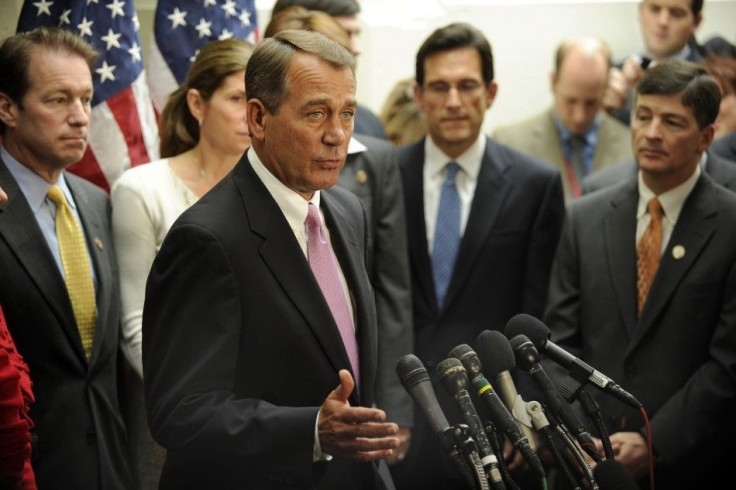GOP: Has It Supported Policies That Create Jobs?
OPINION

Where are we now, in terms of programs to fix the U.S. economy? About where the nation was nine months ago -- and it's in no small part due to Republican Party error, intransigence and denial.
But first, a little background.
Ever since the Republican Party was restored to power in the U.S. House in the 2010 election, the talk in Washington has been about budget deficits, and about how bad the deficit is for a variety of things.
If you're perplexed about a House caucus led by Speaker John Boehner, R-Ohio, not fulfilling its promise to create jobs, you're not alone.
House Republicans Campaigned on Jobs Creation
For those who aren't aware, House Republicans' No. 1 campaign promise in 2010 was to create jobs to lower the high unemployment rate. Elect the GOP, they said, and we'll create jobs.
But about a year in to their reign, where are the jobs? They're hard to find, and what's even harder to find is the House Republican jobs program: it doesn't exist, not in any meaningful way.
So what did the House Republican caucus concentrate on this year? Well,
1) they tried to shut down the U.S. government, 2) they almost forced the U.S. government to default, and oh yes, 3) they worked on a bill to create light bulb freedom so you can continue to buy inefficient incandescent light bulbs.
The nation needs public policies to help create 11 million jobs that we're short, and House Republicans are devoting time to light bulb freedom. Talk about leaders that aren't responsive to the public.
Republicans Still Eyeing Tax Cuts for Uber Rich
What else did the House Republican caucus do with nearly a full year of leadership? Well, they argued that one way to create jobs is to -- imagine that -- cut the top marginal income tax rate to 25 percent from 35 percent -- which would provide yet another tax cut to the uber rich and upper-income groups.
The tax cut is problematic on a number of counts, the most jobs market relevant of which is that there's no guarantee that cutting taxes on people with adjusted gross incomes of $5 million or $10 million or $50 million per year will result in those individuals using that extra money in ways that will create jobs.
The uber rich and upper income groups are just as likely to put that money in a hedge fund or transfer it overseas to some Swiss or off-shore account.
Aside from light bulb freedom and advocating another giveaway to the rich, the House Republican caucus has spent time talking about the budget deficit. Don't misunderstand: Long-term, the deficit has to be cut, and will be. But in the short term, the more we cut the deficit, the more demand we'll take out of the U.S. economy.
But you'd never know this from listening to the likes of Boehner and Republican House Majority Leader Eric Cantor. They'd have you believe that the budget deficit is a worse problem than finding full-time jobs for the roughly 15 million Americans who desperately want them but can't find them.
Let's look at the House GOP's budget deficit straw men one at time:
Budget deficit will lead to rampant inflation? Nope, inflation remains tame.
Budget deficit will devalue the dollar? The dollar is holding its own against the euro and British pound.
Budget deficit will lead to skyrocketing interest rates? Interest rates continue to fall: the interest rate on the benchmark 10-year U.S. Treasury note wsas down to 1.92 percent on Monday at midday.
Falling Interest Rates Indicate Lack of Demand
Further, House Republicans need to pay careful attention to that last economic data point: Interest rates, despite fiscal stimulus and two rounds of quantitative easing by the U.S. Federal Reserve, continue to fall -- something that's indicative of a lack of demand.
Underscoring the problem facing the U.S. economy isn't the supply of capital -- corporations are sitting on more than $2 trillion in cash -- or a lack of money among upper-income groups, who control more than $30 trillion in wealth. Rather, it's a lack of demand -- i.e., a lack of consumers.
In other words, the U.S. economy needs jobs -- not policies that allow the uber-rich to transfer excess wealth from one tax haven to another. Public policies that put Americans back to work building roads, bridges, schools, hospitals, airports, and the electric grid, among many other worthwhile public investments.
Light bulb freedom. Another tax cut for people who don't need one. Theatrics about nonexistent rising interest rates.
If the House Republican caucus is trying to demonstrate that it can pass policies that can help all of American society, they're doing a terrible job.
© Copyright IBTimes 2024. All rights reserved.





















